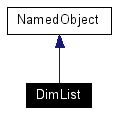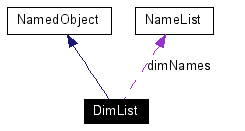
#include <DimList.h>
Inherits NamedObject.
Inheritance diagram for DimList:


Public Member Functions | |
| DimList (const char *name, NameList &dimNames) | |
| Creates a named DimList object, initializing it with a set of feature names. | |
| DimList (DimList &dl) | |
| Copy constructor; makes a copy if the passed DimList object. | |
| ~DimList () | |
| void | registerDataColumns (NameList &dataSetColumnNames) |
| Associates a data set's features with the DimList. | |
| int | size () |
| Accessor method. | |
| const int | get (int i) |
| Exposes the contents of the internal lookup table. | |
| void | add (const string &dimName) |
| Lets you build a DimList incrementally. | |
| const string & | getDimName (int i) |
| Lookup a feature name, given its index; the converse of add(). | |
| NameList & | getDimNames () |
| Accessor method. | |
These can consist of the entire set of features for a data set, or some subset. They're stored by name, and stored internally as a NameList object. In addition, the DimList stores a lookup table mapping the entries in the NameList to the columns of a Data set. Before a data set can be used by a classifier, it must be registered with a DimList instance, so that the classifier can translate references to dimension names to column indices.
|
||||||||||||
|
Creates a named DimList object, initializing it with a set of feature names.
|
|
|
Copy constructor; makes a copy if the passed DimList object.
|
|
|
|
|
|
Lets you build a DimList incrementally.
|
|
|
Exposes the contents of the internal lookup table. This assumes that the DimList has been associated with a data set's features, via the registerDataColumns() call.
|
|
|
Lookup a feature name, given its index; the converse of add().
|
|
|
Accessor method.
|
|
|
Associates a data set's features with the DimList. Causes a lookup table to be constructed, storing mappings from the indices of the items in the DimList to the columns in a data set.
|
|
|
Accessor method.
|
 1.4.3
1.4.3